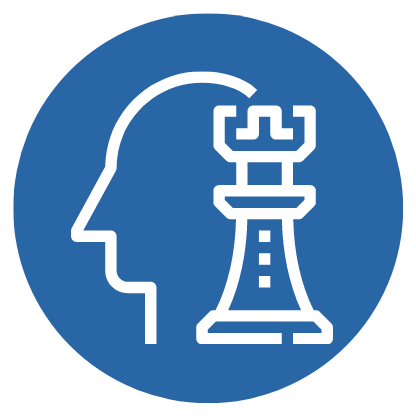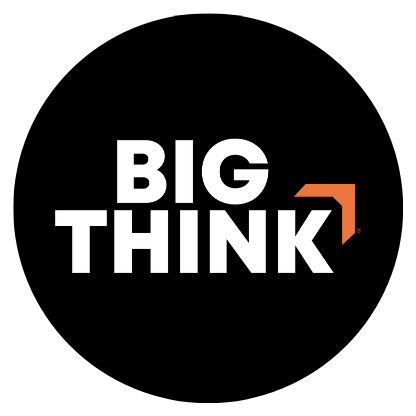Unlock the power of asking the right questions with this Big Think video.
The art of asking the right questions, as demonstrated by Warren Berger, is becoming increasingly important in a world where knowledge is abundant and easily accessible. In Silicon Valley and other centers of innovation, great questions are at the root of many breakthroughs and innovations. Questions can help organize our thinking, allowing us to make sense of the information we have, and use it to find the next answer. In schools, however, questioning is often not valued, and has declined as children get older. Asking dumb questions and journaling are tools that can help us think laterally, and break the boundaries of our comfort zone. The power of the absurd question can revolutionize our businesses and our lives.
Learning Outline
1. Questions are becoming more valuable than answers in areas of innovation.
2. Questions enable us to organize our thinking around what we don't know.
3. Curiosity driven research is questions that we try to answer.
4. Questions are at the root of innovation.
5. Questioning declines as we get older due to lack of emphasis in school.
6. Naïve questions can lead to concrete results.
7. Asking "dumb" questions can help us think laterally.
8. Journaling can help us develop ideas from questions.
Instructional Content
Asking the right questions is an important skill to have in the modern world. With access to a wealth of knowledge, it's easy to become overwhelmed and confused by the sheer amount of information available. Asking the right questions can help us make sense of the world around us and lead us to innovative solutions.
In this video, Warren Berger, Hope Jahren, Jonathon Keats and Tim Ferriss discuss the importance of asking questions. According to Berger, questions are often the root of innovation and can help us organize our thinking around what we don't know. Jahren encourages us to look at things we are familiar with in unique ways and Keats suggests starting with naïve questions. Finally, Ferriss encourages us to ask "dumb questions" and use journaling to explore them further.
Asking the right questions is essential for success in a time of dynamic change. By understanding the importance of this skill and working to develop it, we can take advantage of the wealth of knowledge that is available to us and create innovative solutions.
Cognition
Cognition is a crucial skill to have in order to succeed in any environment. Analytical Literacy, Creativity and Innovation, and Strategic Thinking are three key elements of successful cognition. Developing these skills requires a comprehensive approach that takes into account the specific details related in each scenario.
The video and transcript provided demonstrate the importance of asking the right questions and how this can lead to innovation and success. Asking the right questions can help us to organize our thoughts and make sense of the information that is available to us. This includes questions that may seem naive or absurd, as they can help to stimulate creative thinking and open up possibilities that may not have been considered before.
In order to develop these skills, learners should be encouraged to ask questions and to explore new ideas. Curiosity should be encouraged and learning should involve open-ended exploration. Teachers should strive to create an environment in which learning is meaningful and engaging, and in which students can ask questions without fear of embarrassment.
In addition, learners should be taught the basics of Analytical Literacy, Creativity and Innovation, and Strategic Thinking. These can include the ability to identify patterns, draw conclusions, and analyze data. They should also be taught the basics of problem-solving and critical thinking, including methods such as brainstorming, mind mapping, and design thinking.
Finally, it is important to provide learners with the opportunity to apply their skills in a practical setting. This can include group projects, simulations, and case studies. This will help learners to develop their skills and gain confidence in their ability to use them in a variety of contexts.
By taking into account the specific scenarios detailed in the video and transcript, as well as the general principles outlined above, educators can provide learners with the tools they need to become competent in the field of Cognition. Doing so will enable learners to develop the skills they need to succeed in the modern world.
Analytical Literacy
Analytical Literacy is an important skill that can help you become more successful in personal growth and professional development. The video “The art of asking the right questions” helps us understand how powerful questions can be in driving innovation and progress. Warren Berger’s research found that many of the innovation breakthroughs in Silicon Valley were driven by a great question. By asking the right questions, we can organize our thinking around what we don’t know and use that knowledge to find answers.
Jonathon Keats’s advice to start any project by asking a naïve question is a great illustration of the power of questions. Sometimes it’s the “dumb” questions that spark a breakthrough and lead us down a path that can be actionable and concrete. Tim Ferriss encourages us to not be afraid to ask dumb questions, as this can be a superpower. By asking questions that challenge the status quo, you can push boundaries and think outside the box.
The research of Malcolm Gladwell and Alex Bloomberg further proves the power of questions. By asking questions that no one else is asking, you can uncover information that could completely revolutionize your business or life.
Analytical Literacy is an invaluable skill that can be developed by asking the right questions. By learning to ask questions thoughtfully and creatively, you can unlock your potential to create new and innovative outcomes.
Creativity and Innovation
In order to be successful in personal growth and professional development, upskilling is key. Asking the right questions can help you upskill and achieve success. This was demonstrated in the video, ‘The Art of Asking the Right Questions’, which featured experts Warren Berger, Hope Jahren, Jonathon Keats and Tim Ferris discussing the importance of asking questions to drive innovation and breakthroughs.
Berger highlighted that in school, there is low emphasis placed on questioning, and teachers are under pressure to simply ‘teach to the test’. This has seen a steady decline in questioning as students move through the grade levels. Jahren added that curiosity driven questions, like those asked by little kids, can lead to interesting insights and applications that can benefit the marketplace. Ferris highlighted the power of ‘dumb’ questions, noting that they can help to break boundaries and think laterally.
Asking questions can be a powerful tool for personal growth and professional development. In fact, according to Berger, ‘questions are the new answers’. It is important to find ways to encourage questioning in the workplace and school environment to ensure that employees and students are upskilled to the best of their ability. By asking the right questions, individuals can develop a ‘superpower’ and achieve success in their growth and development.
Strategic Thinking
Upskilling yourself through strategic thinking can be an invaluable tool in personal growth and professional development. The video “The Art of Asking the Right Questions” by Big Think outlines the importance of questioning as a key tool for innovation and problem solving. Warren Berger examines research that shows how questioning declines as we get older, and how teachers are so stressed to teach to the test that they have difficulty entertaining questions.
On the other hand, Hope Jahren explains how curiosity-driven research begins with a simple question, and how even simple questions can lead to groundbreaking discoveries. She emphasizes how asking questions can take us to more concrete and actionable ideas. Jonathan Keats furthers this idea by suggesting that asking naïve questions can lead to creative solutions and great opportunities.
Tim Ferriss also explains how asking "dumb questions" can be a superpower. He shares how world class performers, investors and entrepreneurs use absurd questions to develop creative solutions that can revolutionize their businesses. His advice is to ask questions and journal them, as this will help to explore potential solutions.
Incorporating strategic thinking and questioning into your upskilling journey can be a powerful tool for personal growth and professional development. By asking questions, taking time to journal and exploring the answers, you can uncover creative solutions and innovative ideas that may lead to tremendous success.
For Learners
Watching this video The Art of Asking the Right Questions is essential for life-long learning. This video provides valuable insight into the power of questions and how they can be used to spark innovation and growth. Watching this video allows you to gain a better understanding of the importance of asking meaningful questions, and how to use them effectively to gain insight into any situation.
Not learning the content of this video will be detrimental to you as a life-long learner. Not being able to ask the right questions will limit your ability to think critically and gain understanding of any given situation. Not learning the content of this video will also limit your ability to innovate and come up with creative solutions, as well as limit your ability to develop and grow professionally.
Using the ‘what’s in it for me’, ‘what’s in it for them’, ‘what’s in it for us’, and ‘what’s in it for the world’ approach to learning the content of this video will benefit you as a learner for personal growth and professional development. Watching this video will help you gain a better understanding of the power of questions and how you can use them to gain insight into any situation. It will also help you to become a better problem solver and critical thinker, allowing you to develop innovative solutions and gain professional growth. Finally, learning the content of this video will help you to become a more effective communicator, which can help you to contribute to the world in a meaningful way.
For Employers
This video provides a unique perspective on the value of questions, and how employers can benefit from it. The power of asking the right questions is an invaluable tool for uncovering innovative solutions, developing creative solutions to problems, and staying ahead of the competition. By learning the concepts in this video, employers can differentiate themselves from their competitors. Additionally, customers and clients will perceive them as more knowledgeable and capable when they know that the employer understands the power of questions.
Moreover, employers will be able to use questioning to engage in conversations with their customers, better understand their needs, and provide them with solutions that are tailored to those needs. This video also demonstrates the power of curiosity-driven research and how it can lead to the development of products and services that have the potential to make a positive impact on people’s lives.
By learning the content in this video, employers will be able to stay ahead of the competition, gain a competitive edge, and provide innovative solutions to their customers. Additionally, they will be able to use questions to guide their decision making, gain deeper insights, and lead their teams more effectively.
In conclusion, employers can benefit from learning the content in this video by gaining a competitive edge, understanding the power of asking the right questions, and developing creative solutions to their customers' needs. This will help them to differentiate themselves from their competitors and build a reputation for being knowledgeable and capable.
Career Path
Completing a course in Cognition based on the competencies of Analytical Literacy, Creativity and Innovation, and Strategic Thinking will help individuals on their career path by giving them a well-rounded approach to problem-solving and job searching. By taking advantage of these key competencies, individuals can develop the confidence to think critically, come up with innovative solutions, and create meaningful strategies for their careers.
Leveling up their career path can be done by watching the video, “The Art of Asking the Right Questions”, which dives deep into the power of questioning and the process of asking the right questions to get to the root of an issue. This video provides insight into how to think critically and look deeper into problems to find solutions. Moreover, the transcript provides a wealth of information on the importance of questioning, the decline of questioning in education, and the value of absurd questions.
By watching this video and reading the transcript, individuals can gain the knowledge and skills to become more employable, promotable, and purposeful. They will be able to develop their analytical literacy, creativity and innovation, and strategic thinking competencies to become more marketable and close the Skills Gap towards meaningful work. Additionally, the video and transcript provide insight into how to think outside the box and approach problems from different angles to find solutions. This will give individuals the confidence to ask the right questions and develop innovative solutions to further their career.
Meaning
"The research. A four-year-old girl is asking as much as 300 questions a day and when kids go into school you see this steady decline that happens as they go through the grade levels to the point where questioning in schools by junior high school is almost at zero." - Warren Berger
This famous quote from Warren Berger in the video "The Art of Asking the Right Questions" emphasizes the importance of questioning. The video argues that questions are now more valuable than answers, and that they are essential in innovation. Berger explains that asking questions helps us to make sense of the vast amounts of information that we have access to.
Questioning is also a skill that is necessary for learners and employers. Learning and innovation often requires us to step out of our comfort zone and ask naive questions. Asking questions can help to open new possibilities and point us in the right direction. Employers value employees who can think critically and ask the right questions. Asking questions can also help us to solve problems, adapt to change and find new solutions.
In conclusion, questioning is an essential skill for both learners and employers. Asking questions can help us to make sense of the world around us and open up new possibilities.
Takeaway
The most important key takeaway I learned from this video is that asking questions, especially seemingly "dumb" ones, is a powerful tool to discovering new insights, uncovering new innovations, and finding solutions to problems. In the age of information overload, asking the right questions is the key to unlocking answers.










 117 Creds - Cognition
117 Creds - Cognition



